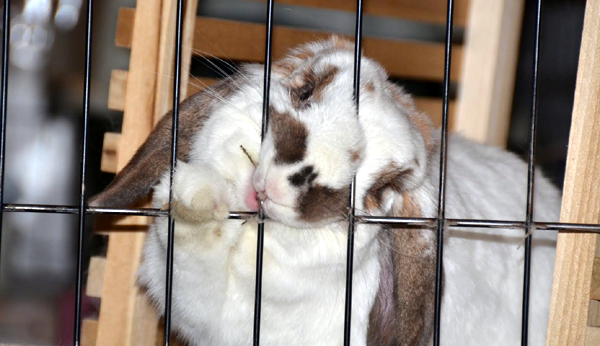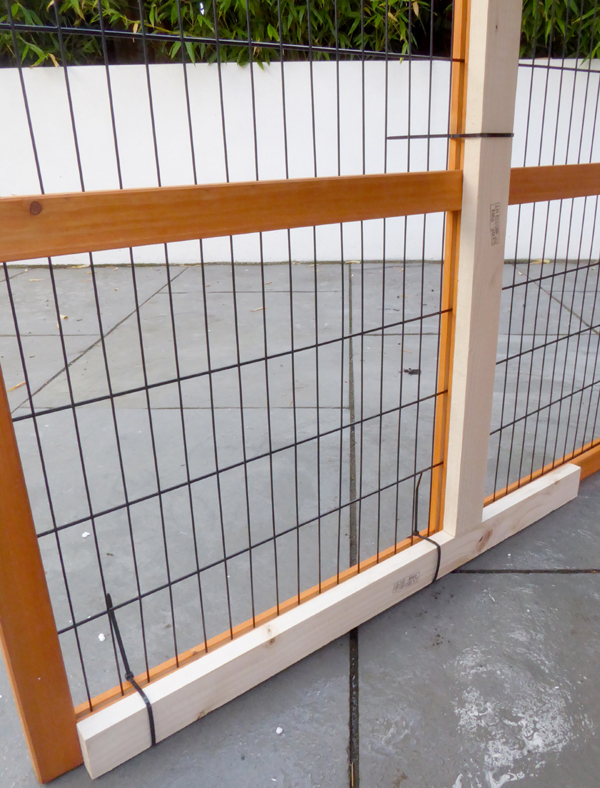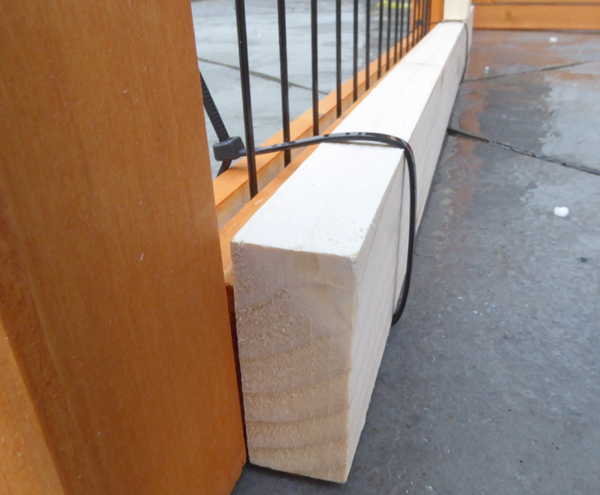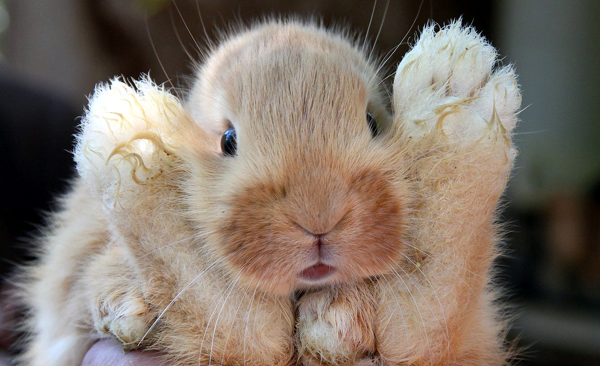How To Stop Your Rabbit From Chewing Their Hutch
Chewing in rabbits is a very natural habit.
This is not to say that every rabbit will chew their rabbit hutch though. But a small minority of rabbits do.
And if you check on the various online forum or even Google it you will see that some owners experience this problem from the start.

Understandably it is frustrating and annoying, but the good news is that it is something that you should be able to control and prevent.
Remember, the onus is on you to take all the necessary precautions to prevent or lessen the chance of them chewing parts of their hutch when you first notice it.
Failing to take action straight away can lead to an unwanted habit being formed, which can be harder to break and if left unchecked can lead to serious damage being done to your hutch in a short space of time.
Here's why rabbits need to chew.
Unlike our teeth, rabbit teeth grow constantly throughout their life and because of this, rabbits need to spend plenty of their time nibbling and chewing to wear their teeth down.
If they don’t wear them down naturally then rabbits’ teeth grow too long and start to grow sharp spikes, which dig into their tongue and cheeks causing painful mouth ulcers. So rabbits are basically genetically programmed to chew.
5 reasons why a rabbit chews their hutch?
Well, there are a few very common reasons why a rabbit may take to chewing at parts of their hutch.
Properly understanding this and then taking the appropriate action can help put an end to it.
The usual suspects for this unwanted behaviour are boredom and not enough enrichment in their enclosure, a lack of space and not enough time spent socializing. Age and hormones can also play a very big part too.
The first steps to stopping your rabbit from chewing their hutch are to see how you can address these 5 areas first.
Could your rabbit be bored?
Are they being kept cooped up inside their hutch by themselves while you and the kids are at work or in school?
Rabbits are social animals, they like companionship. Being left alone in a hutch for most of the day can be avery sorry experience and the reason they are bored and frustrated. So they turn to chew parts of their hutch.
Consider a companion.
Rabbits should always be kept in pairs or more.
If this is not practical, (due to aggressive behaviour) then you need to ensure that they have plenty of interaction with you and your children.
Because, your rabbit may just want to be sociable.
If your rabbit is aware that you are at home and feels that it is not allowed to join you and might be missing out on fun or food then it may keep testing the boundary of its enclosure to try and escape.
Forum Quote " Even though my mini lop Rexy was loose all day, he still acted bored. (A usual indication of boredom is when he starts destroying stuff.)
So I took to playing with him intensely for 30-40 mins at night before bed. I'd chase him around the house, let him chase me, and wrestled with him.
It wore him out enough so he would behave himself, and he looked forward to our play (he wasn't a biter). I had another rabbit, CoCo and even though she was spayed, she'd chew obsessively and she would throw her bowl around the cage.
She finally chilled out when I got her a harness and walked her around the neighborhood. Your rabbit might just be experiencing a little frustration- even if you are doing everything right."
So spending more time with them is may be all that is needed to put an end to their destructive behaviour!
Give them more space.
Consider extending the size of their hutch by adding a run. Many of our hutches have runs that are specifically designed to fit onto the front of their respective hutch.
Or you can invest in a standalone run and use connectors and tubes to join the two.
Is it a sign of frustration?
It's not uncommon for people to give their rabbits free range during the day, be it in an outside enclosure or access to the garden.
Come early evening you put your rabbit back in their hutch thinking that they'd had enough time to 'play'.
However, what you need to bear in mind is that rabbits are most active during dusk and dawn and overnight and just at the moment that they are keen to carry on exploring, they are being told to 'go to bed'.
Like a small child, there might be a bit of playing up and frustrationfor a rabbit and this could be expressed in unwanted chewing of the hutch bars or wooden framework.
Make their environment more stimulating.
Try scattering and hiding their food around their hutch to encourage their natural foraging behaviour and to keep them busy.
Cardboard boxes left empty or filled with veggies or hay are also a good option. You could even close them up and give your bunnies a challenge of trying to get the food out.
You can use sisal rope to hang chew toys and food for them, from the hutch or put some hay or veggies stuffed inside a toilet roll for them to flip around and play with.
Rabbits are constantly looking for roughage to eat as its vital for their digestion to work well and they will happily chew on wood or other soft materials we consider indigestible for the fibre it contains.
So provide plenty of alternatives on which your rabbit can safely chew.
Things like branches from an apple or willow tree and a few chewable toys might also be worth considering. The more alternative items to chew on, and the greater variety, the better.
Make sure you are supplying plenty of hay as well.

It might be an age thing.
Age and hormones can play a very big part in unwanted chewing.
As a general observation young rabbits tend to chew more than older ones, females tend to chew more than males and unneutered rabbits have a much higher tendency to chew than ones that have been spayed.
All rabbits not used for breeding should be neutered. It is a very common and reasonably simple procedure, that usually costs between £50 and £100.
Taking preventative measures.
At the very least as an owner of a pet, you should be following the advice above as a matter of course.
Providing a large hutch and plenty of run space, as well as an enriched environment, plenty of toys, food and hay and companionship is what should be expected as a loving responsible rabbit owner.
But despite this, some rabbit's just like to chew and unfortunately, they don't have a concept of what is acceptable or unacceptable.
So the onus has to be on you to take preventative measures.
The most common starting point is bitter sprays.
There are a variety of anti-chew sprays on the market which work to varying degrees.
As a matter of course, we would recommend you get yourself a few brands and see which one works best.
Amazon stock a range of sprays (click here) or try your local pet shop or Pets@Home store
Below are a few readibly available brands.
Grannicks Bitter Apple
Spray
Johnsons Anti-Chew Repellent
Get Off Chew Stoppa
Spray
Simple Solutions Chew
StopperChew
A tip: Looking at online reviews and feedback about the various sprays available, they seem to have around about a 50% success rate.
But many rabbits don't mind the taste, (and some even seem to like it), so while this may be worth a try, it is often not effective.
Try test the anti-chew spray on items your rabbit likes to chew. That way you don't end up spraying your entire hutch with a spray that your rabbits actually enjoys and turn your hutch into Hansel and Grettle's proverbial gingerbread house!
If it does work with your rabbit, then the spray must be re-applied frequently.
You should apply the spray directly to the affected area and keep reapplying it regularly (every couple of days) so it doesn't lose its effectiveness.
If that doesn't work then you could also try a cheap alternative like watered down vinegar spray and other homemade remedies and see if that does the trick.
How to train a rabbit.
Another important technique and something that is quite often overlooked, is behavioral training.
Every time you notice your bunny is starting to chew at their hutch try clapping your hands and loudly saying “No!” (no need to yell) and then give your rabbit an appropriate chew toy.
Most people report that it’s easy to make their bunnies understand them and for some, disciplining them actually does work.
Just be mindful that they aren't actually begging for food and each time you try to distract your rabbit with a treat you are unwittingly reinforcing the unwanted habit.
If telling your rabbit off does not work, a stronger deterrent can be to keep a water mister handy and when you catch your rabbit starting to chew, spray a mist of cold water over them along with a stern "No!".
Another common technique is to use an empty jar filled with coins that you can shake as a warning.
Protect and prevent them from accessing the area.
If you find that the sprays aren't working and you don't have the time for effective training and discipline, then the only other option is to provide some sort of barrier between your rabbit and the area it is intent on chewing.
A simple strip of new wood screwed, nailed or even cable tied onto the area might be a quick and easy solution to the problem and help keep that area of your hutch intact.


(A 2.4 m length of rough sawn timber from a place like B&Q is going to set you back less than £2.50.)
They can rather eat this and you can simply replace the pieces as needed.
We've also heard of people gluing on a piece of aluminium to the chewed area or even wrapping some metal wire around the area to prevent their bunnies from getting access to it.
Providing some sort of preventative barrier or one that they can chew
on regardless, is probably your best option if your rabbit
just seems intent on chewing at their hutch.

Thinking of buying a hutch?
The overwhelming majority of people keeping rabbits or guinea pigs are not going to have any issues with their rabbit or guinea pig chewing.
But unfortunately, the fact remains that a very small minority of pet owners do and some rabbits will constantly chew at their hutch.
You may be one of those right now just looking at ways to stop your rabbit chewing your hutch.
Hopefully, with a few of the suggestions listed above, you will be able to get the chewing under control.
Or you may be visiting our website for the first time looking for a hutch.
Our rabbit and guinea pig hutches are made to a higher standard than most in our price range and we are very proud of our range and the constant feedback we get from customers is that the quality surpasses expectation.
But no rabbit hutch available in the U.K is 100% chew-proof. It doesn't matter if it's made from wood or plastic.
(We have personally asked most of our competitors when researching this article and none claimed to be chew proof or would guarantee that damage wouldn't occur if a rabbit chewed at the wood.)
So if your rabbit or guinea pig turns out to be one of those frustrating minority that tend to chew and they are simply given free rein to chew at parts of their hutch for an extended period of time, then inevitably they are going to cause damage to it.
We've made a host of suggestions and preventative measures to take immediately, should they start their unwanted chewing
If you make a genuine effort and put the welfare of your pet front and centre and follow our suggestions listed above, then you are not going to have an issue with unwanted behaviour.
Rabbits and Guinea pigs make loving and intelligent pets and can be a cheaper and better alternative for some than having a cat or dog.
